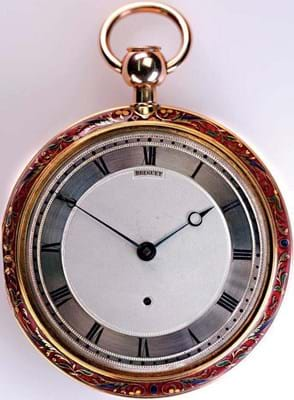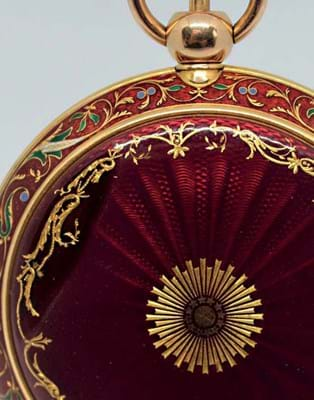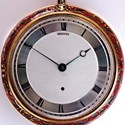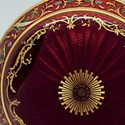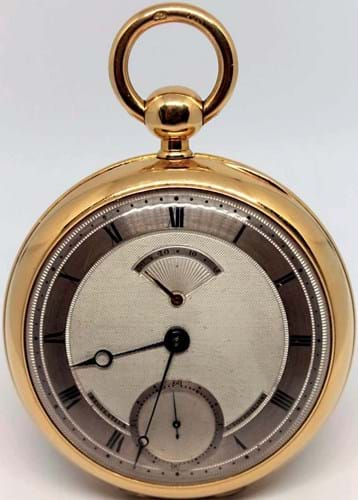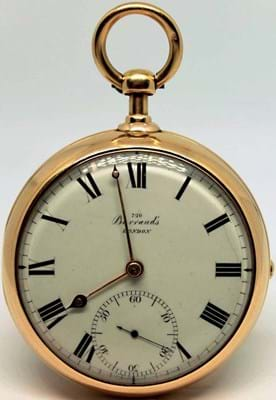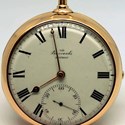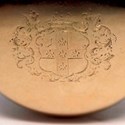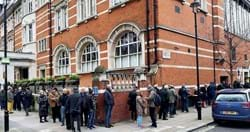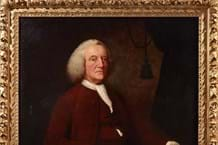The cache of watches, unseen on the market for close to a century, sold for £145,000 at Lawrences of Bletchingley on the second day of a March 17-19 sale, was a complete sell out.
The watches had been bought in the early years of the 20th century by Francis Payne, a successful London-based consulting and mining engineer. Several of the pieces, consigned by the Payne family, were offered together with their original invoices from various leading retailers and auction houses at the time including the Hanover Street dealer and restorer Louis Desoutter.
The collection included four watches by Abraham-Louis Breguet (1747-1823) that together made over £80,000. The most outwardly impressive of the four was a pair-cased half hunter made for the Ottoman market. The gold inner and outer cases are both decorated in guilloche enamel on a claret ground. The quarter-repeating sapphire cylinder movement is numbered No 2330.
Housed in a red morocco leather covered case by Desoutter, together with a Breguet key, it included a Breguet certificate No. 2774, detailing the sale of the watch by Leroy Constantinople in 1811, and paperwork from Breguet detailing various 19th century repairs carried out for the Ottoman civil servant Abraham Pacha.
It also included a Louis Desoutter invoice to Francis Payne dated December 12, 1928 for £55, together with various notes and labels attached suggesting a link with the Ottoman sultan Sellim III. Estimated at £40,000-60,000, it sold to an online bidder at £46,000.
On September 5, 1928, Payne had bought a Breguet open faced ‘souscription’ watch for £15. They take their name from Breguet’s novel way of drumming up custom for an expensive accessory: from 1798 it was marketed on a subscription basis via a brochure, with a down-payment for each order.
Approximately 700 examples were made with various technical variations: this one in gold with a ruby cylinder escapement was a relatively late example signed Horger de la Marine Royal, No. 4028, 8/1827. Remarkably it came with its original Breguet invoice, dated 1827 for Fr1200. Estimated at £6000-8000, the hammer price of £9600 came from an online bidder.
A Breguet gold repeating lever watch, numbered 3174, came with paperwork from Maison Breguet documenting repair work and alterations carried out by the Rue de la Paix workshop in 1899. Offered in a red morocco leather covered octagonal case together with a Breguet key and length of watch chain, the hammer price, this time tendered via thesaleroom.com, was £9800.
The fourth Breguet watch was a pivoted detent tourbillon chronometer. As documented in a letter included with the lot, Payne had bought this highly sophisticated open-faced watch in 1930 shortly after Louis Desoutter had died. His widow had written to the collector offering to sell him the watch for £42 10s.
Inscribed to the inner cover Regulateur a Tourbillon, it is further inscribed No. 4 Chronometre Tourbillon, Moremble Eleve de Breguet. The successful bidder on the phone tendered £17,000.
Breguet patented a new type of regulator, that he called the ‘tourbillon’, in 1801. Working with the observation that gravity is the enemy of all horological movements, he hit on the idea of installing the entire escapement inside a mobile carriage that performs a complete rotation each minute. Only 35 tourbillons were sold between 1805 and 1823, the year of the maestro’s death.
Also sold to a phone bidder was a fine English gold watch with a royal connection. This ‘dumb half’ quarter repeating pair cased pocket chronometer had two key selling points.
It was signed to the back plate Barraud’s, Cornhill, London, No. 720 while to the case (hallmarked for London 1815) was the engraved arms of George IV for whom the watch is reputed to have been made. Reference to its possible former owner was made on an accompanying sale invoice from Louis Desoutter, dated September 28, 1927.
Payne paid £20 for it 93 years ago. Bidding last week reached £15,500.


